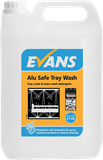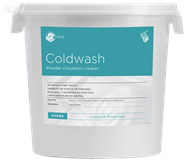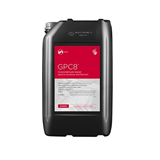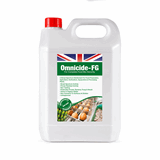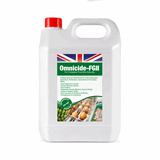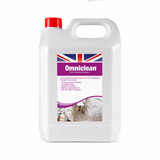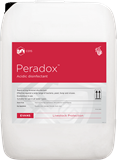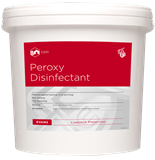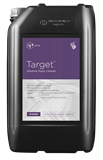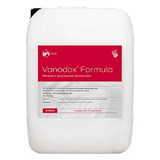Farm Animal Disinfectant Supplier
Powerful & fast acting, offering high levels of protection
We supply farm animal safe disinfectant products for farmers in the UK. Our product range includes Fam 30, GPC8 Glutaraldehyde, Omnicide and Vanadox. Order online today.
Highly efficient, aluminium safe, low foaming detergent for use through automatic ware washing machines and for manual washing.
A highly caustic detergent powder No heating of water required Effective for all water hardnesses Mixes easily, non-foaming, rinses freely Leaves machines, pipelines and jars clean and bright
An extremely powerful & fast-acting Defra Approved (Foot & Mouth, Swine Vesicular, Poultry & General Orders) & listed in the Aquatic Disinfectant Listing Scheme, Iodophor based disinfectant, approved for animal use. Buy online today.
GPC8 Disinfectant Cleaner DEFRA Approved (Foot & Mouth and General Orders), Glutaraldehyde formulation. Effective against African Swine Fever, Aujesky’s Disease, Avian adenovirus, Avian influenza, Foot & Mouth Disease Virus, Hepatitis B & C, HIV. Buy Online Today!
Omnicide Disinfectant is an animal Disinfectant, which is effective against Swine Flu, Avian Influenza and Influenza of Avian origin, Newcastle Disease and Coronavirus. A highly effective disinfectant for protection against a broad spectrum of animal disease approved by DEFRA. Omnicide is the original synergistic blend of Glutaraldehyde and Quaternary Ammonium Compound Cocobenzyl Dimethyl Ammonium Chloride. Omnicide™ a world leading biosecurity product for over 30 years and continues to give protection in healthcare in many areas. Omnicide™ has been independently tested all over the world and is approved by Defra in the UK for notifiable diseases. Always refer to manufacturers MSDS before use.
Omnicide FG Food Grade is available and spanning the food industry’s needs from production to packed and finished products. They are used to disinfect transport vehicles, slaughterhouses, cold storage, food processing and preparation areas, food packing areas and distribution vehicles.
Omnicide FGII Food Grade is available and spanning the food industry’s needs from production to packed and finished products. They are used to disinfect transport vehicles, slaughterhouses, cold storage, food processing and preparation areas, food packing areas and distribution vehicles.
Omniclean is a heavy duty fast foaming detergent ideal for first stage cleaning of animal housing, transportation, hatcheries and food processing areas. Omniclean™ is the ideal product to be used in conjunction with Omnicide. Omniclean contains a non-ionic and cationic surfactant that will remove a wide variety of surface debris and soil such as protein, fats and biofilm.
Peradox-25kg is A clear, colourless disinfectant. Effective against a wide range of bacteria, viruses and fungi encountered in intensive livestock husbandry, milk production and processing.
Effective against all known classes of virus, fungi and bacteria Suitable for use as an aerial, surface and water disinfectant Safe to use; fast dissolving and non staining Effective in hard water and at low temperatures
Powerful, heavy duty cleaner for effective removal of food soil Suitable for the food process industry, all slaughterhouse and meat processing factories Can be used with hot or cold water.
A specially formulated iodophor, stabilised for use with all types of livestock and domestic pets.Cleans and disinfects in one operation. Colour coded to indicate activity.
Vanodox 20ltr is a stabilised blend of Peroxyacetic Acid in equilibrium and is effective against a wide range of bacteria, fungi & viruses. Effective against Newcastle Disease Virus, Foot & Mouth Disease Virus, Coxsackie B5 Virus, Rota Virus, Vaccinia Virus, Reo Virus, Infectious Bursal Disease Virus Dv86, Ecbo Virus, Aujeszkys Disease Virus, Swine Fever Virus.
Detergent disinfectant for the food process and animal husbandry industries. Ideal for single or two-stage clean and disinfection programmes.
Useful Information on Bird Flu in the UK
Bird Flu has recently been brought back up in the UK media, so it is useful to share some information about the epidemiology of the virus, how to contain it, chemicals to use and share some common sense information on prevention of the spread if you are unfortunate enough to get it in your flock.
Although these four strains don’t affect humans easily, nor commonly and they aren’t spread from human to human; several people have been infected around the world. No humans have been infected with H5N1, H7N9, H5N6 or H5N8 bird flu in the UK – this includes the type of H5N6 virus recently found in humans in China.
H5N8 bird flu has been found in some wild birds and poultry in the UK. H5N6 has also been found in some wild birds in the UK but is a different strain to that seen in China.
You can find the latest situation on newly reported cases and guidance on the Government website https://www.gov.uk/guidance/avian-influenza-bird-flu#latest-situation.
Bird Flu is spread by close contact with an infected bird (dead or alive), and can be contracted by touching infected birds; touching droppings or bedding and killing infected poultry for cooking.
You cannot catch bird flu through eating infected poultry or eggs if they have been thoroughly cooked.
If you keep poultry, whether in your garden or commercially on a farm, it is important that you keep a close eye on them; maintain good bio security. During the winter months there is a higher risk of contamination from migrating wild birds, so it is particularly important to watch out for any symptoms in your birds.
Bird flu is a notifiable animal disease. If you suspect any type of bird flu in poultry you must report it immediately by calling the Defra Rural Services Helpline on 03000 200 301. In Wales, contact 0300 303 8268. In Scotland, contact your local Field Services Office. Failure to do so is an offence.
Good biosecurity improves the overall health and productivity of your flock by helping keep out poultry diseases such as avian influenza and limiting the spread of disease in an outbreak.
This applies just as much if you only have a few birds as pets, or if you have a large commercial flock. An outbreak of bird flu in back garden chickens results in the same restrictions on movement of birds. It has the same effect on farmers and trade in poultry as an outbreak on a commercial farm.
To ensure good biosecurity, all poultry keepers should:
- minimise movement in and out of bird enclosures
- clean footwear before and after visiting birds, using a Defra approved disinfectantat entrances and exits
- clean and disinfect vehicles and equipment that have come into contact with poultry
- keep areas where birds live clean and tidy, and regularly disinfect hard surfaces such as paths and walkways
- humanely control rats and mice
- place birds’ food and water in fully enclosed areas protected from wild birds, and remove any spilled feed regularly
- avoid keeping ducks and geese with other poultry species, where possible
- keep birds separate from wildlife and wild waterfowl by putting suitable fencing around outdoor areas they access
- keep a close watch on birds for any signs of disease and report any very sick birds or unexplained deaths to your vet
Biosecurity is the prevention of disease causing agents entering or leaving any place where they can pose a risk to farm animals, other animals, humans, or the safety and quality of a food product.
Good biosecurity should be practised at all times, not just during a disease outbreak. Taking the right measures in the early stages of an outbreak e.g. before we know disease is in the country, can help prevent or reduce its spread.
In terms of chemicals we provide to help with good preventative and chemicals that will help during an outbreak, you can find them here. All chemicals we supply in this section are DEFRA approved.
Omnicide is a great all rounder, and is effective in very small amounts against a broad spectrum of viruses including Bird Flu, Swine Disease etc. We also offer Fam 30 which is another highly effective chemical and GCP8 and Vanodox. We regularly stock all four of these chemicals, so if you have an outbreak you can contact us for 24 hour delivery, or just use a good Bio Security Chemical as part of your Bio Security Practices.
DEFRA and the UK government are basically recommending common sense actions to ensure you and your family are kept safe and well. Wash your hands well and often with any soap and water, or you could get an anti-microbial soap which will kill the virus for certain – such as GOJO ANTI-MICROBIAL SOAP, or WHITE BACTERICIDAL SOAP. It might be useful to have a read over my Soap without sanitisers and soap with sanitisers blog again to refresh your memory.
For those of us out there who don’t keep birds as pets or commercially farm birds, we remain at a very low risk, and contraction of bird flu is very rare. For those who do keep birds for commercial farming and or as pets, good bio security is essential, make sure you wash your boots, protect your birds when they are outside, disinfect your vehicles, take extra precautions by wearing PPE (googles, gloves, aprons) when dealing with a suspicious bird death, and use your common sense.
Separate your bird species, and I can’t stress this enough make sure your bio security is up to the job if Bird Flu is transmitted to your area and you are keeping birds in a high risk area. It is better to set up protocol and get everyone following it, when you are not under pressure and when your flock is not at risk that to try and set up protocol when tensions are high and everyone is stressed. Lay the foundations now, to keep your flock safe.


